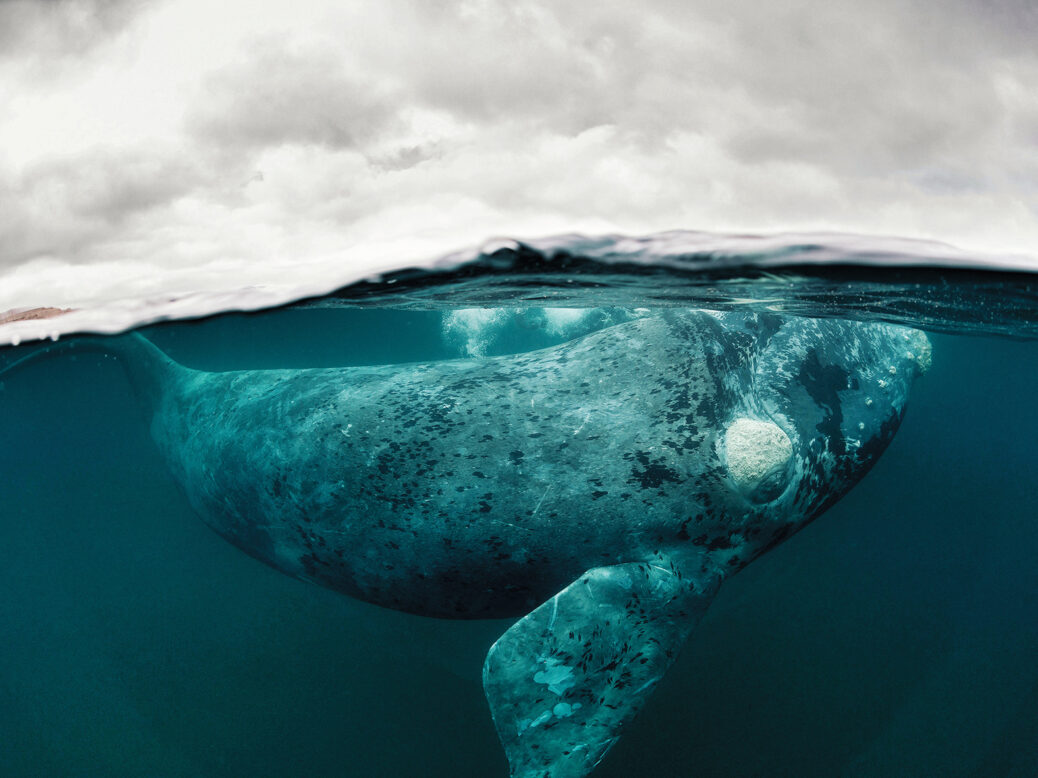
As a child, I was enthralled by the idea that whales could sing. A cassette tape of their strange reverberations bewitched me. But it also led me to wonder: what was it they were trying to say?
A few decades later and a new book from Doreen Cunningham offers a beautiful exploration of that mystery. Structured around an impulsive decision to follow the 10,000-mile migration route of the grey whale from the breeding lagoons of Mexico to the Arctic ocean, Soundings: Journeys in the Company of Whales charts Cunningham’s attempt to pass on her awe for the non-human world to her two-year-old son. This boat-filled odyssey requires all the bank loans and self-belief that she can muster. In its unfolding, it is a reminder that whales have more to tell us than the human ear alone can detect.
The author’s own connection to the sea began on the island of Jersey, where she and her siblings would regularly swim as if they were “sea mammals”, holding their “fingers welded together like fins”. One night-time excursion was so immersive that Cunningham recalls: “When I hauled myself out in the moonlight, I wasn’t sure I had fully retrieved me, that part of me wasn’t left there among the sparks in the water.” Unlike her often emotionally distant mother, the ocean “embraced” her, “fulfilling an unmet need”.
[See also: Spring reflection: What tadpoles taught me]
Alongside this primordial affinity, Cunningham was growing aware of humanity’s often fraught relationship with nature. She describes how whales populated her illustrated Bible in the story of Jonah, trapped inside one until he was sufficiently repentant. She saw whales resurface in television reports about the destruction wreaked by commercial fishing fleets. Each Sunday, she would pray to God to fend off the threats of nuclear war, acid rain and extinctions – and to “please stop people killing the whales and dolphins and seals”.
Her early awareness of both nature’s power and its vulnerability led to Cunningham making a professional commitment to addressing humanity’s ever-growing environmental crisis: first as a scientific researcher, then as a journalist battling against the BBC’s previous perverse insistence on giving airtime to climate change deniers. But her understanding of humanity’s destructive tendencies also left her aching to find community and belonging.
By the time Cunningham had survived a terrible custody battle for her son, her life had begun to “twist and snap”. So to prove to her son (and herself) that “it is possible to do anything, to overcome anything”, she set out in search of her whales.
“We share the same survival instinct, feelings that tell us to go towards things, or get away,” she writes of the empathy that connects all species. “I want to tell the whales thank you, just for being here.”
[See also: The wood may not yet be silent, but its birds are far quieter]
Through such delicate merging of environmental and individual trauma, Soundings births a raw, intimate narrative about nature’s capacity to mend – and justifies its place alongside modern nature writing classics, such as Helen Macdonald’s H is for Hawk. Furthermore, it adds to this well-trodden terrain by engaging with a less familiar realm of experience: that of the Inuit people of Utqiagvik.
Six years before her odyssey across the North American continent, Cunningham spent time researching for a work assignment in Alaska’s northernmost town. Here, living closely alongside its people, she learned to whittle whale bones, to hunt, and to fall in love – leaving with a deeper understanding of both the community’s nature-close way of life and its persecuted past. Returning with her son becomes a chance to celebrate all that the Inuit still have to teach, even as a warming ocean threatens the roots of their whaling culture.
Listening to a tourist guide’s simplified account of the region’s recent history, she laments: “It’s not seeing the Earth as home, treating it with love and respect as the Tlingit did. It’s categorising it, owning it, abusing it, wrecking it. The glaciers don’t seem quite so friendly to me now. It’s like they’re pissed off, throwing things.”
At a time when global crisis follows global crisis, Cunningham’s book is an urgent reminder of our capacity to both hurt and heal the natural world – along with ourselves.
Soundings: Journeys in the Company of Whales
Doreen Cunningham
Virago, 320pp, £18.99
This article appears in the 06 Apr 2022 issue of the New Statesman, Easter Special






